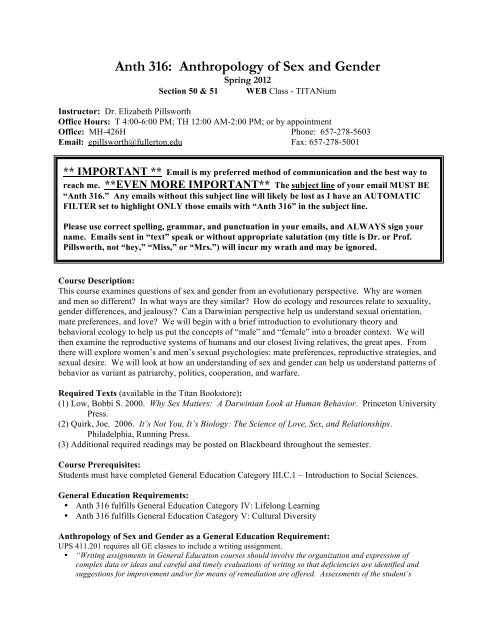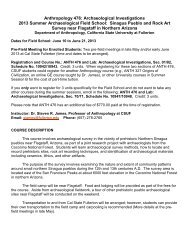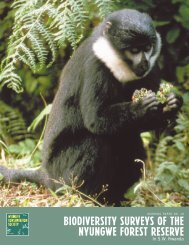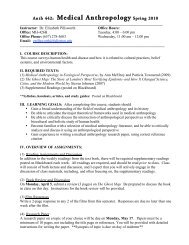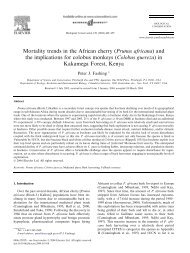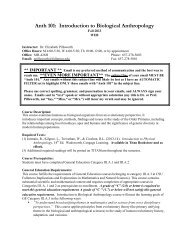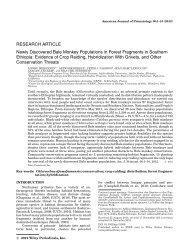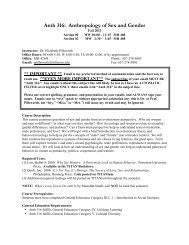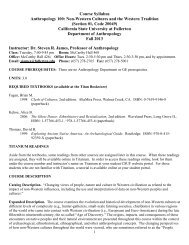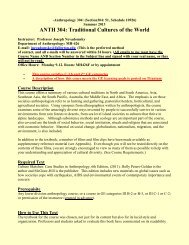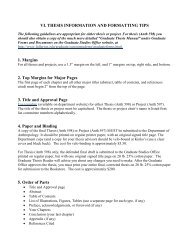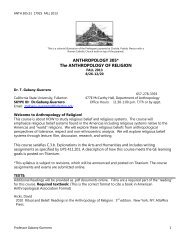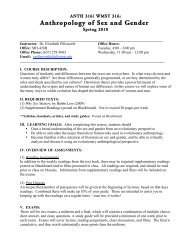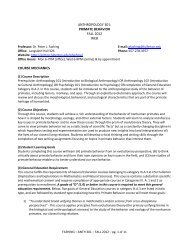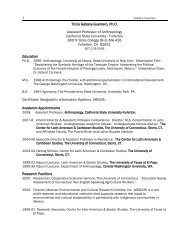Anth 316: Anthropology of Sex and Gender - CSUF Anthropology
Anth 316: Anthropology of Sex and Gender - CSUF Anthropology
Anth 316: Anthropology of Sex and Gender - CSUF Anthropology
You also want an ePaper? Increase the reach of your titles
YUMPU automatically turns print PDFs into web optimized ePapers that Google loves.
<strong>Anth</strong> <strong>316</strong>: <strong>Anth</strong>ropology <strong>of</strong> <strong>Sex</strong> <strong>and</strong> <strong>Gender</strong><br />
Section 50 & 51<br />
Spring 2012<br />
WEB Class - TITANium<br />
Instructor: Dr. Elizabeth Pillsworth<br />
Office Hours: T 4:00-6:00 PM; TH 12:00 AM-2:00 PM; or by appointment<br />
Office: MH-426H Phone: 657-278-5603<br />
Email: epillsworth@fullerton.edu Fax: 657-278-5001<br />
** IMPORTANT ** Email is my preferred method <strong>of</strong> communication <strong>and</strong> the best way to<br />
reach me. **EVEN MORE IMPORTANT** The subject line <strong>of</strong> your email MUST BE<br />
“<strong>Anth</strong> <strong>316</strong>.” Any emails without this subject line will likely be lost as I have an AUTOMATIC<br />
FILTER set to highlight ONLY those emails with “<strong>Anth</strong> <strong>316</strong>” in the subject line.<br />
Please use correct spelling, grammar, <strong>and</strong> punctuation in your emails, <strong>and</strong> ALWAYS sign your<br />
name. Emails sent in “text” speak or without appropriate salutation (my title is Dr. or Pr<strong>of</strong>.<br />
Pillsworth, not “hey,” “Miss,” or “Mrs.”) will incur my wrath <strong>and</strong> may be ignored.<br />
Course Description:<br />
This course examines questions <strong>of</strong> sex <strong>and</strong> gender from an evolutionary perspective. Why are women<br />
<strong>and</strong> men so different? In what ways are they similar? How do ecology <strong>and</strong> resources relate to sexuality,<br />
gender differences, <strong>and</strong> jealousy? Can a Darwinian perspective help us underst<strong>and</strong> sexual orientation,<br />
mate preferences, <strong>and</strong> love? We will begin with a brief introduction to evolutionary theory <strong>and</strong><br />
behavioral ecology to help us put the concepts <strong>of</strong> “male” <strong>and</strong> “female” into a broader context. We will<br />
then examine the reproductive systems <strong>of</strong> humans <strong>and</strong> our closest living relatives, the great apes. From<br />
there will explore women’s <strong>and</strong> men’s sexual psychologies: mate preferences, reproductive strategies, <strong>and</strong><br />
sexual desire. We will look at how an underst<strong>and</strong>ing <strong>of</strong> sex <strong>and</strong> gender can help us underst<strong>and</strong> patterns <strong>of</strong><br />
behavior as variant as patriarchy, politics, cooperation, <strong>and</strong> warfare.<br />
Required Texts (available in the Titan Bookstore):<br />
(1) Low, Bobbi S. 2000. Why <strong>Sex</strong> Matters: A Darwinian Look at Human Behavior. Princeton University<br />
Press.<br />
(2) Quirk, Joe. 2006. It’s Not You, It’s Biology: The Science <strong>of</strong> Love, <strong>Sex</strong>, <strong>and</strong> Relationships.<br />
Philadelphia, Running Press.<br />
(3) Additional required readings may be posted on Blackboard throughout the semester.<br />
Course Prerequisites:<br />
Students must have completed General Education Category III.C.1 – Introduction to Social Sciences.<br />
General Education Requirements:<br />
• <strong>Anth</strong> <strong>316</strong> fulfills General Education Category IV: Lifelong Learning<br />
• <strong>Anth</strong> <strong>316</strong> fulfills General Education Category V: Cultural Diversity<br />
<strong>Anth</strong>ropology <strong>of</strong> <strong>Sex</strong> <strong>and</strong> <strong>Gender</strong> as a General Education Requirement:<br />
UPS 411.201 requires all GE classes to include a writing assignment.<br />
• “Writing assignments in General Education courses should involve the organization <strong>and</strong> expression <strong>of</strong><br />
complex data or ideas <strong>and</strong> careful <strong>and</strong> timely evaluations <strong>of</strong> writing so that deficiencies are identified <strong>and</strong><br />
suggestions for improvement <strong>and</strong>/or for means <strong>of</strong> remediation are <strong>of</strong>fered. Assessments <strong>of</strong> the student’s
writing competence shall be used in determining the final course grade.” Your reading questions <strong>and</strong> papers<br />
fulfill this requirement because you will organize <strong>and</strong> express complex data <strong>and</strong> ideas related to your growing<br />
underst<strong>and</strong>ing <strong>of</strong> the foundations <strong>of</strong> human behavioral ecology. You will receive timely feedback <strong>and</strong> you will<br />
have the opportunity to edit your response paper <strong>and</strong> resubmit it.<br />
According to our university, General Education courses fulfilling category IV (Lifelong Learning) should<br />
address the issues listed below.<br />
• “Further students’ own critical self-underst<strong>and</strong>ing <strong>and</strong> acquire the knowledge, skills, <strong>and</strong> attitudes necessary<br />
to engage <strong>and</strong> reflect in learning <strong>and</strong> self-development practices.” Students will be required to critically<br />
evaluate popular media representations <strong>of</strong> sex <strong>and</strong> gender, <strong>and</strong> reflect how these relate to their own selfunderst<strong>and</strong>ing.<br />
• “Develop strategies to be integrated physiological, socio-cultural, <strong>and</strong> psychological beings to promote a<br />
holistic awareness <strong>of</strong> lifelong learning throughout their lives.” Students will learn about sex <strong>and</strong> gender from<br />
the perspectives <strong>of</strong> biological evolution, cultural norms, <strong>and</strong> psychology, allowing them to integrate these<br />
perspectives in their underst<strong>and</strong>ing <strong>of</strong> self, <strong>and</strong> apply a similar holistic approach to other areas <strong>of</strong> their lives.<br />
• “Actively apply <strong>and</strong> participate in developing lifelong commitment to health for both personal well-being <strong>and</strong><br />
societal responsibility.” Topics will include sexual behavior, risk-taking, aggression, cooperation, <strong>and</strong><br />
reproduction <strong>and</strong> require students to apply theoretical knowledge to real-world, every-day situations<br />
• “Develop themselves as responsible citizens, employees <strong>and</strong> employers, family members, <strong>and</strong> members <strong>of</strong> the<br />
global society.” Students will learn about human diversity, gender stereotypes, <strong>and</strong> sexual behavior, <strong>and</strong> will<br />
be asked to reflect on notions <strong>of</strong> equity, tolerance, <strong>and</strong> underst<strong>and</strong>ing.<br />
According to our university, General Education courses fulfilling category V (Cultural Diversity) should address<br />
the issues listed below.<br />
• “Demonstrate underst<strong>and</strong>ing that culture is socially constructed <strong>and</strong> fundamental to social interaction.”<br />
Students will learn about the human capacity for culture <strong>and</strong> the importance <strong>of</strong> cultural learning, <strong>and</strong> how these<br />
apply to cultural variations in gender stereotypes, gender roles, <strong>and</strong> sexual behavior.<br />
• “Demonstrate appreciation <strong>of</strong> the complex relationships that various factors such as gender, ethnicity, race,<br />
sexual orientation, religion, <strong>and</strong> class bring to a discussion <strong>of</strong> society <strong>and</strong> culture.” The course will draw<br />
upon many cross-cultural, cross-temporal, <strong>and</strong> cross-species examples to underst<strong>and</strong> how ecology, evolution,<br />
history, <strong>and</strong> culture impact sex <strong>and</strong> gender.<br />
• “Demonstrate underst<strong>and</strong>ing that because we live in an inter-connected world, we need to underst<strong>and</strong> the<br />
diversity <strong>and</strong> relationships within <strong>and</strong> among cultures.” Students will learn about human diversity, gender<br />
stereotypes, <strong>and</strong> sexual behavior both within <strong>and</strong> between cultures, <strong>and</strong> will be asked to apply these ideas to<br />
questions <strong>of</strong> equity <strong>and</strong> tolerance.<br />
• “Recognize <strong>and</strong> evaluate how one’s cultural history affects one’s sense <strong>of</strong> self <strong>and</strong> relationship to others.” In<br />
exploring sexual <strong>and</strong> romantic behavior, as well as sex roles <strong>and</strong> gendered-divisions <strong>of</strong> labor, in a crosscultural<br />
perspective, students will be required to reflect on their own cultural background <strong>and</strong> how it relates to<br />
their own practices <strong>and</strong> ideas.<br />
(Quotes from UPS 411.201).<br />
Course Objectives:<br />
Our objectives are to develop a deeper underst<strong>and</strong>ing <strong>of</strong>:<br />
• <strong>Sex</strong>ual <strong>and</strong> reproductive behavior in humans<br />
• Variation in gender roles, sexual behavior, <strong>and</strong> gender identity<br />
• Evolutionary theory<br />
• The evolution <strong>of</strong> sex roles<br />
• How sex <strong>and</strong> gender relate to broader domains <strong>of</strong> human social behavior<br />
Grading:<br />
Participation (6% <strong>of</strong> total grade): As an online course, I will occasionally post a participation activity,<br />
such as the “Introduce Yourself Forum” from Week 1. These will be worth one point each, or
one point for each part <strong>of</strong> a multi-part activity (either done or not-done). Your Participation<br />
“score” will be the percentage <strong>of</strong> points earned (that is, the number <strong>of</strong> activities you completed<br />
divided by the number assigned). This grade will be weighted to make up 6% <strong>of</strong> your final<br />
course grade.<br />
Discussion Boards (15% <strong>of</strong> total grade): The Discussion Board is the primary vehicle we have for class<br />
participation in an online forum. This is where I expect you to engage with the material <strong>and</strong> ideas<br />
from the course <strong>and</strong> with your fellow students. There will be a Discussion Board for each week<br />
<strong>of</strong> the semester. Participation is m<strong>and</strong>atory, <strong>and</strong> is graded based on the quality <strong>of</strong> your posts (e.g.<br />
relevance, insight, demonstration <strong>of</strong> thought, <strong>and</strong> clarity). Each post will be graded on a 0-3 scale<br />
(missing, unacceptable, acceptable, <strong>and</strong> excellent). Details regarding posts are provided on<br />
TITANium. Your Discussion Board grade will make up 15% <strong>of</strong> your final course grade.<br />
Discussion Leader (4% <strong>of</strong> total grade): One week out <strong>of</strong> the semester, you will be r<strong>and</strong>omly assigned<br />
the role <strong>of</strong> “Discussion Leader.” Discussion Leaders are responsible for posting Topics on the<br />
Discussion Board for that week. Discussion Topics will be grade on a 0-5 scale (details posted on<br />
TITANium), <strong>and</strong> your Discussion Leader grade will be weighted to make up 4% <strong>of</strong> your total<br />
class grade.<br />
Tests (30% <strong>of</strong> total grade): There will be approximately four short (25 questions) tests for this course.<br />
Each test will be equal in length <strong>and</strong> scope <strong>and</strong> will primarily cover the most recent course<br />
content only. Tests will be multiple choice <strong>and</strong> short answer format, <strong>and</strong> will be timed. They are<br />
closed-book tests.<br />
Paper (45% <strong>of</strong> total grade): There is one research paper in this class, but the task will be broken up<br />
into three separate assignments. You will submit an annotated bibliography (30 points) in about<br />
Week 6; a first draft <strong>of</strong> the paper (70 points) in about Week 9; <strong>and</strong> a final paper (100 points)<br />
during Finals Week. Students must work independently on their papers. Student writing<br />
competence will be assessed based on the ability to successfully integrate course material <strong>and</strong><br />
apply that integrated knowledge to critical thinking <strong>and</strong> reasoning skills. You will be required to<br />
research <strong>and</strong> cite articles from peer-reviewed scholarly journals in your papers. Your paper grade<br />
will be the total number <strong>of</strong> points earned out <strong>of</strong> 200 (30 + 70 + 100). This grade will be weighted<br />
to make up 45% <strong>of</strong> your final class grade.<br />
Extra Credit: Extra credit opportunities may be provided at pr<strong>of</strong>essor discretion.<br />
Grading Scale:<br />
A+ 98% or greater C+ 78 – 79%<br />
A 92 – 97% C 71 – 77%<br />
A- 90 – 91% C- 69 – 70%<br />
B+ 88 – 89% D+ 67 – 68%<br />
B 82 – 87% D 60 – 66%<br />
B- 80 – 81% F 59% or less<br />
Special Needs: The learning community at <strong>CSUF</strong> respects all forms <strong>of</strong> diversity. Please see me if you<br />
need accommodations for a registered disability, or to fulfill cultural or religious obligations. Students<br />
with special needs should contact Disabled Student Services to register <strong>and</strong> learn about the services<br />
available to support their learning. You may learn more from their website<br />
http://www.fullerton.edu/disabledservices/index.htm
Academic Integrity: Students are expected to maintain a high st<strong>and</strong>ard <strong>of</strong> academic integrity. Students<br />
who violate university st<strong>and</strong>ards <strong>of</strong> academic integrity are subject to disciplinary sanctions, including a<br />
grade <strong>of</strong> “0” on the assignment, failure in the course, <strong>and</strong> suspension from the university. Since<br />
dishonesty in any form harms the individual, other students, <strong>and</strong> the university, policies on academic<br />
integrity are strictly enforced. Familiarize yourself with the academic dishonesty policy, which can be<br />
found in the current student h<strong>and</strong>book or on the web at<br />
http://www.fullerton.edu/senate/PDF/300/UPS300-021.pdf<br />
Cheating is not fair to students who earn their grades fairly (good or bad!). Dishonesty includes, but is<br />
not limited to, cheating, plagiarizing, fabricating information or citations, facilitating acts <strong>of</strong> academic<br />
dishonesty by others, having unauthorized possession <strong>of</strong> examinations, submitting work <strong>of</strong> another person<br />
or work previously used without informing the instructor, or tampering with the academic work <strong>of</strong> other<br />
students. All students are expected to follow the ethical principles <strong>of</strong> academic integrity. Minimally, if a<br />
student violates these principles in my class, he or she will be required to meet with me outside <strong>of</strong> class<br />
<strong>and</strong> redo any work involved, or I may assign a “0” grade on the assignment. Maximally, I will give the<br />
student a failing grade in the class <strong>and</strong> refer the matter to the Associate Dean <strong>of</strong> Judicial Affairs in the<br />
Office <strong>of</strong> Student Affairs.<br />
Emergency Procedures Notice to Students<br />
The safety <strong>of</strong> all students attending California State University Fullerton is <strong>of</strong> paramount importance. During an emergency it is<br />
necessary for students to have a basic underst<strong>and</strong>ing <strong>of</strong> their personal responsibilities <strong>and</strong> the University’s emergency response<br />
procedures. In the event <strong>of</strong> an emergency, please adhere to the following guidelines.<br />
Before an emergency occurs:<br />
• Know the safe evacuation routes for your specific building <strong>and</strong> floor.<br />
• Know the evacuation assembly areas for your building.<br />
When an emergency occurs:<br />
• Keep calm <strong>and</strong> do not run or panic. Your best chance <strong>of</strong> emerging from an emergency is with a clear head.<br />
• Evacuation is not always the safest course <strong>of</strong> action. If directed to evacuate, take all <strong>of</strong> your belongings <strong>and</strong> proceed safely<br />
to the nearest evacuation route.<br />
• Do not leave the area. Remember that faculty <strong>and</strong> other staff members need to be able to account for your whereabouts.<br />
• Do not re-enter building until informed it is safe by a building marshal or other campus authority.<br />
• If directed to evacuate the campus, please follow the evacuation routes established by either parking or police <strong>of</strong>ficers.<br />
After an emergency occurs:<br />
• If an emergency disrupts normal campus operations or causes the University to close for a prolonged period <strong>of</strong> time (more<br />
than three days), students are expected to complete the course assignments listed on the syllabus as soon as it is reasonably<br />
possible to do so.<br />
• Students can determine the University's operational status by checking the University's web site at<br />
http://www.fullerton.edu, calling the University's hotline number at 657-278-4444, or tuning into area radio <strong>and</strong> television<br />
stations. Students should assume that classes will be held unless they hear or read an <strong>of</strong>ficial closure announcement.
<strong>Anth</strong> <strong>316</strong>: <strong>Anth</strong>ropology <strong>of</strong> <strong>Sex</strong> <strong>and</strong> <strong>Gender</strong><br />
Spring 2012<br />
Class Schedule (subject to change)<br />
LOW = Low, Bobbi S. 2000. Why <strong>Sex</strong> Matters: A Darwinian Look at Human Behavior. Princeton<br />
University Press.<br />
QRK = Quirk, Joe. 2006. It’s Not You, It’s Biology: The Science <strong>of</strong> Love, <strong>Sex</strong>, <strong>and</strong> Relationships.<br />
Philadelphia, Running Press.<br />
Week 1<br />
January 23<br />
Week 2<br />
January 30<br />
Week 3<br />
February 6<br />
Topics<br />
• Course introduction<br />
• Underst<strong>and</strong>ing data<br />
PART I: Theory <strong>of</strong> evolution <strong>and</strong> reproduction<br />
• Evolutionary theory<br />
• Behavioral ecology method<br />
• Evolution <strong>of</strong> sexes<br />
• Behavioral strategies<br />
• Reproductive ecology<br />
• Mating <strong>and</strong> parenting effort<br />
• Reproductive variance<br />
• Life history theory<br />
• Mating systems <strong>of</strong> apes <strong>and</strong> humans<br />
• Parent-<strong>of</strong>fspring conflict<br />
• Trivers-Willard hypothesis<br />
Readings/Assignments<br />
To be completed BEFORE class<br />
on the day they are assigned<br />
LOW, Chpt 1-2 (pp. 3-34)<br />
Begin reading QUIRK<br />
LOW, Chpt 3-4 (pp 35-76)<br />
Continue reading QUIRK<br />
Continue reading QUIRK<br />
TEST 1<br />
Week 4<br />
February 13<br />
Part II: <strong>Sex</strong>ual desire <strong>and</strong> behavior<br />
• <strong>Sex</strong>ual strategies theory<br />
• Mate preferences<br />
LOW, Chpt 5-6 (pp 77-112)<br />
Continue reading QUIRK<br />
Week 5<br />
February 20<br />
• Contextual preferences <strong>and</strong> desires<br />
• Ovulatory studies<br />
Pillsworth & Haselton, 2007<br />
(posted on TITANium)<br />
Finish reading QUIRK<br />
Week 6<br />
February 27<br />
• Cultural variation in mating patterns <strong>and</strong><br />
preferences<br />
• Polygyny threshold<br />
LOW, Chpt 7 (pp 113-128)<br />
TEST 2
Week 7<br />
March 5<br />
Week 8<br />
March 12<br />
Week 9<br />
March 19<br />
March 26<br />
Week 10<br />
April 2<br />
Week 11<br />
April 9<br />
Week 12<br />
April 16<br />
Week 13<br />
April 23<br />
Writing a Research Paper – Part I<br />
• Defining your research topic<br />
• Research using online databases<br />
• Writing an annotated bibliography<br />
Part III: <strong>Sex</strong> differences <strong>and</strong> social behavior<br />
• <strong>Sex</strong> <strong>and</strong> resources (economics)<br />
• Risk-taking <strong>and</strong> showing <strong>of</strong>f<br />
• Cooperation <strong>and</strong> conflict<br />
• <strong>Sex</strong> <strong>and</strong> coalitions<br />
• Politics <strong>and</strong> reproductive competition<br />
NO CLASS – SPRING RECESS<br />
• Warfare<br />
• <strong>Sex</strong>, resources, <strong>and</strong> early warfare<br />
• Societal complexity <strong>and</strong> war<br />
Writing a Research Paper – Part II<br />
• Defining your research question<br />
• Writing a strong thesis statement<br />
• Supporting your argument<br />
Part IV: <strong>Sex</strong>ual orientation <strong>and</strong> identity<br />
• Cultural constructions <strong>and</strong> definitions <strong>of</strong><br />
gender<br />
• <strong>Sex</strong>ual orientation<br />
• Genetics <strong>and</strong> sexual orientation<br />
• <strong>Sex</strong>ual orientation <strong>and</strong> sexual strategies<br />
ASSIGNMENT: Annotated<br />
Bibliography<br />
LOW, Chpts 8-10 (pp 127-180)<br />
LOW, Chpts 11-12 (pp 181-212)<br />
LOW Chpt 13-14 (pp 213-244)<br />
TEST 3<br />
ASSIGNMENT: Draft 1 <strong>of</strong><br />
Paper<br />
Readings TBA<br />
Johnson, et al., 2007<br />
Mustanski & Bailey, 2003<br />
Zietsh, et al., 2008<br />
Week 14<br />
April 30<br />
Week 15<br />
May 7<br />
• Transgender identity<br />
• Reconciling biological <strong>and</strong> cultural<br />
explanations <strong>of</strong> gender experience<br />
Writing a Research Paper – Part III<br />
• Interpreting pr<strong>of</strong>essor feedback<br />
• How to exp<strong>and</strong> your argument<br />
Bailey & Triea, 2007<br />
Additional Reading TBA<br />
TEST 4<br />
Exam Week<br />
May 14<br />
No Final Exam scheduled<br />
FINAL PAPER due<br />
WEDNESDAY, MAY 16


